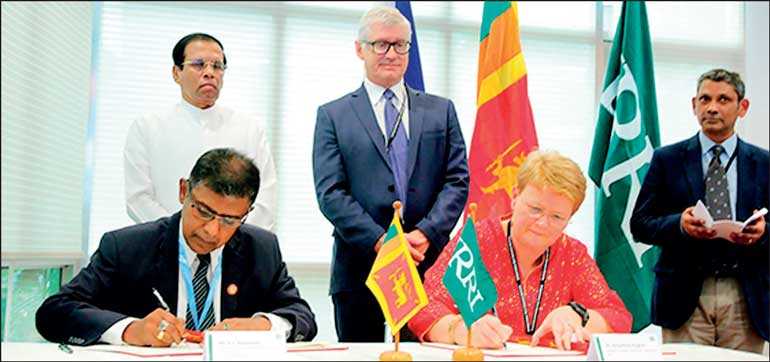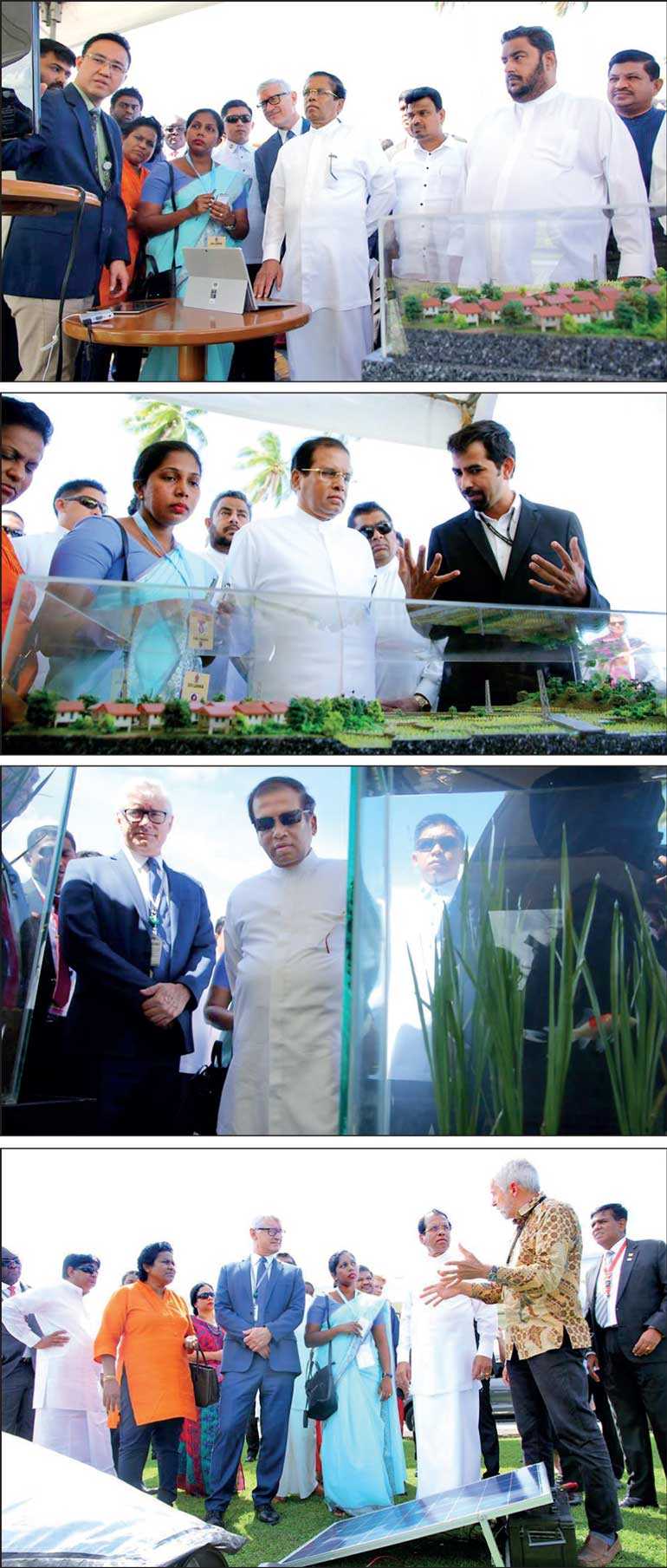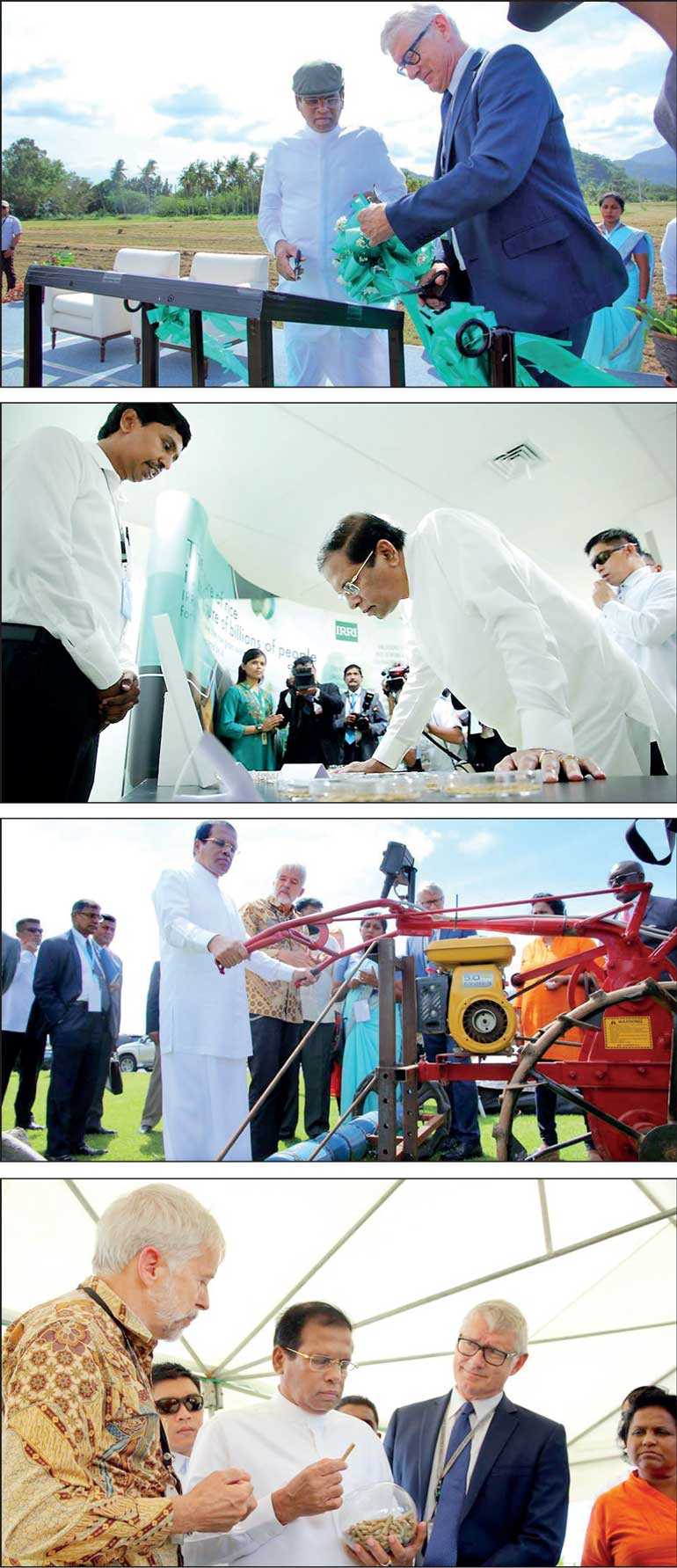Monday Feb 16, 2026
Monday Feb 16, 2026
Monday, 21 January 2019 00:00 - - {{hitsCtrl.values.hits}}


On the sidelines of entering into a five-year agreement to boost partnership, the International Rice Research Institute (IRRI) last week recognised Sri Lanka’s President Maithripala Sirisena for his contribution to the development of agriculture. A statement from the President’s Office said that a piece of land in the IRRI’s headquarters in Los Baños, Philippines was named after Sirisena. As part of his five-day State tour of the Philippines, the President visited IRRI and met with its officials.
“President Sirisena’s interest in agriculture was highly appreciated by the IRRI Director General Dr. Matthew Morell. The Director General said that if every global leader holds a clear vision on agriculture, a new revolution can be made all over the world,” the President’s Office statement added.
The President remarked that facing climatic changes, Sri Lanka should be self-sufficient and sustained with the production of rice and that it is his expectation to see such a development.
President Sirisena mentioned that for three times he has gone on observational visits as a deputy minister and as a minister to the International Rice Research Institute and that he is happy that he could visit this place for the fourth time as the President and that he shares close ties with the Rice Institute as a leader closer to the field of Agriculture.

The President expressed gratitude for reserving a piece of land of this premise in his name.
President Sirisena said that the countries of the Asian region as well as in the whole world needs to free the people from poverty and to develop agriculture.The services rendered by the International Rice Research Institute was much help to achieve that objective.
A key initiative during the visit was the inking of a comprehensive work plan to advance Sri Lanka’s rice self-sufficiency goals through joint research for development projects in the country in the next five years.The Sri Lanka-International Rice Research Institute 5-year Work Plan will compliment and help implement the new Sri Lanka National Plan for the Rice Sector. The plan is guided by 10 priority themes which will serve as the framework for joint collaborative research for development (R4D) pipeline projects aimed to enhance the resilience and viability of Sri Lanka’s national rice sector.In a normal year, Sri Lanka produces ca. 4.6 million mt annually with the average yield of 4.3 t/ha. This means the country’s current rice productivity level is less than half of its potential.
The new work plan will focus on developing high-yielding and climate resilient rice varieties with multiple tolerance to biotic and abiotic stresses, genomics-based breeding technologies, nutritious and value-added rice, capacity building and mechanisation, among others. The project proponents also plan to promote more robust seed systems, and sustainable farm management practices.
IRRI Deputy Director General for Research Jacqueline Hughes and Ministry of Foreign Affairs Additional Secretary for Bilateral Affairs Sumith Nakandala signed the agreement.
Earlier on during his visit, the President was welcomed by two Sri Lankan students studying at the IRRI.
The President was also engaged in an observational visit where he observed its procedure.The IRRI has the biggest rice bank which releases a variety of seeds. The rice which belongs to different parts of the world is preserved there for the future. This research institute produces varieties of seeds that are highly resistant to any drought, flood, and antibiotics and releases genes to all the countries. The rice varieties should be preserved and distributed to the world that is faced with global warming and the objective behind this is to produce seed varieties that match global warming.
The ways to cultivate paddy that can be resistant to droughts and floods as well as planting seeds within different levels of heating levels was discussed and the President paid attention to this analysis.
As well as an introduction regarding managing cultivations which was presented to the President, the seeds that are only available in Sri Lanka also came under the President’s observation.
In order to reduce the impact made to the production of paddy in Sri Lanka due to climatic changes and to uplift its progress and quality, programs were scheduled to be held with the assistance of the IRRI. The Director General explained this to the President.
The ways of cultivating seeds under modern technology were also exhibited to the President.
